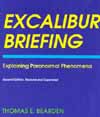
| 157. Probability: the probability of a simple event is the ratio of the number of times it occurs to the total number of trials (for a large, essentially infinite number of trials). Note that "trials" constitute things that have occurred (are past). Probability has resisted rigorous logical definition by Aristotelian logic; the reason is that it is an expression of the fourth law, the identity of opposites. Probability is the expression of the future (that which has not occurred) in terms of the past (that which has occurred). Since we have been trained to conceive or think of something as if it had just been perceived to occur, then this is the only way we can conceive the future. But with Aristotelian logic, the future cannot be composed of the past, and probability has no acceptable logical basis. With four-law logic, the future can be modeled in terms of -- and even be identical to -- the past, and probability has a logical basis. Consider "throwing a die to land with one face up." Thinking of the event (as if it has just occurred, in terms of the most recent past), one can conceive six ways of looking at it. In other words, one can conceive of six "most recent pasts." By the fourth law, the total "most recent past" is identical to the "most immediate future," on the boundary. If one therefore collects all six "most recent pasts," they turn into the most immediate future, by the fourth law of logic. One may attempt to argue that only a single one of the events will actually occur. Here one counters with the observation that, when it occurs, it is the past, not the future, and it has not been collected so as to move to the boundary. |